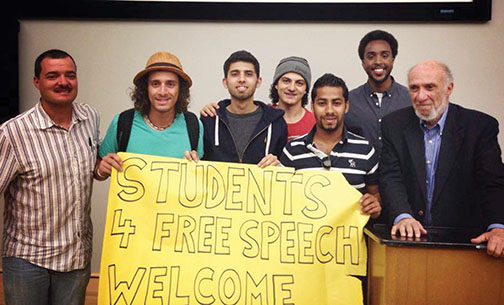As students sat down at their desks on what would have usually been a routine Monday afternoon in Peterson Gym, room 242, protesters, media teams and curious bystanders crowded into the inconspicuous lecture hall.
For the past few months, the Institute on World Affairs class has been visited by a variety of distinguished guest speakers as part of a lecture series entitled “Blood on our Hands: Moral Responsibility in Global Affairs.” The guest speaker for the day’s lecture was University of California Santa Barbara lecturer and Professor Emeritus of Princeton University Richard Falk.
The controversy of the lecture has less to with the lecture topic and more with the speaker’s record. For the past few years Falk has served as the U.N. special rapporteur for human rights in the occupied Palestinian territories and during his tenure released several scathing reports on human rights abuses by the Israeli government.
Local “pro-Israel” advocacy organization StandWithUs released an “action alert” shortly before the presentation, calling for SDSU to cancel the lecture or move it off campus because of Falk’s background. According to the group, having Falk on campus is equivalent to saying SDSU is anti-Israel.
Director of the International Security and Conflict Resolution program Jonathan Graubart addressed the group’s concerns as he introduced Falk, explaining that the lecture topic had little or nothing to do with the Israeli-Palestinian conflict.
“For a group that bills itself as supporting free speech, it seems unfair to ask anything more of Mr. Falk than has been asked of any of the other guest lecturers we’ve had,” Graubart said.
As Falk began his lecture he also addressed the crowd that had gathered.
“Unfortunately for many of those here today I did not come here to discuss the case of Israel,” Falk said. “However it is, in my opinion, one of the most important cases for us to discuss today, especially in the U.S.”
Falk’s lecture tackled a variety of topics ranging from the West’s response to human rights abuses to how people interpret power. During his lecture Falk was especially critical of the U.S.’s use of military power to resolve conflicts.
“The idea that military might is a true measure of a country’s power abroad is an illusion,” Falk said.
According to Falk, use of military force has been problematic in solving conflicts in any country with a population of more than 10 million since the ‘50s.
“The future of global change is with the citizens, not the governments of states,” Falk said. “Most governments, including that of the U.S., have yet to understand this.”
As it became apparent that the lecture was not going to be an especially dramatic spectacle, local news teams and many of the protesters began to trickle out of the back door of the lecture hall.
The topic of the Israeli-Palestinian conflict was not raised again until those gathered in the lecture hall were given a chance to ask Falk questions. Graubart allowed many of his students to ask questions about Falk’s theoretical background but the questions quickly turned to attack’s on Falk’s stance on Israel as the floor was opened to the others gathered for the lecture.
Graubart had to repeatedly mediate as many of the members of the crowd called Falk an “anti-Semite” and criticized Falk’s past writings on Israel.
Falk, who is of Jewish descent, defended himself explaining he was strictly doing his job when he wrote the negative reports on Israel.
“Unfortunately the case of Israel is one of the clearest examples of human rights violations under international law today,” Falk said. “I was simply doing my job.”
Members of StandWithUs declined to comment following the lecture.
Photo courtesy of Salaheddin Al-Khawaja







